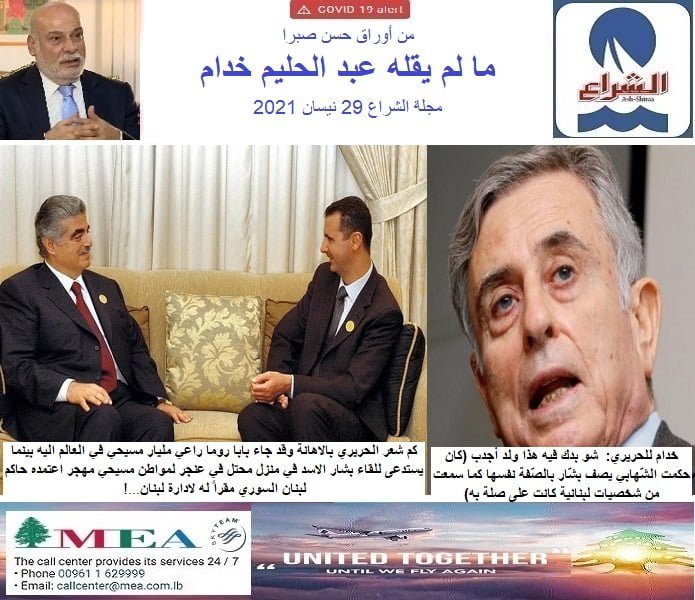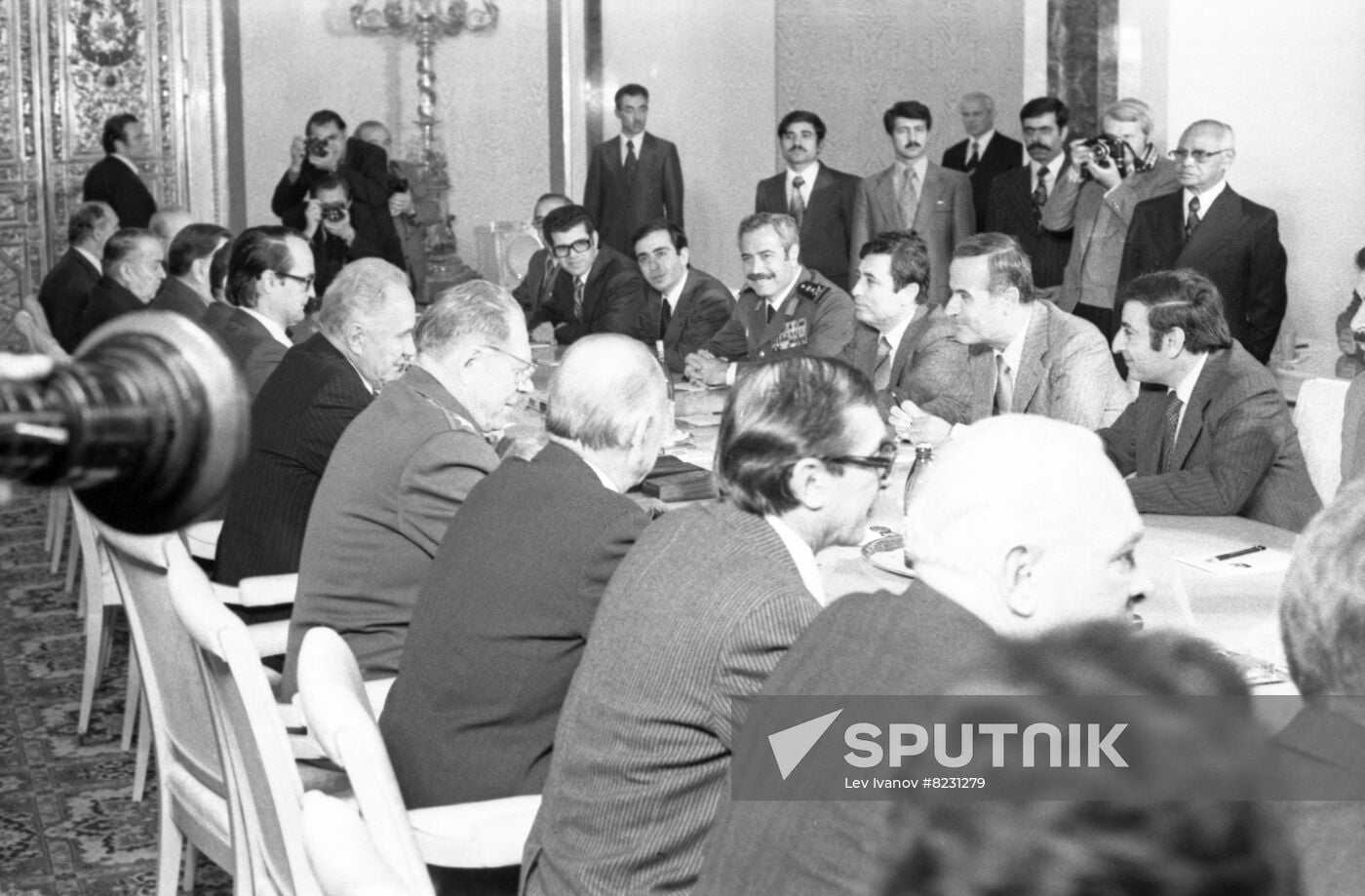I have had a long and extensive relationship with the Syrian Minister of Foreign Affairs, the Vice President of the Syrian Arab Republic, Al-Siddiq Abdel Halim Khaddam. I met him in his office and at his home in Damascus, as well as at President Rafiq Hariri’s house in Beirut on Foch Avenue. Telephone calls with him were intermittent during his time in Paris after he announced his split from Bashar’s regime on New Year’s Eve 2006.
Abu Jamal (may Allah have mercy on him) was always generous in providing me with the information I needed, especially when I was preparing my book on Syria: “The Return of the Homeland – The Fall of the Family.” Readers in the Middle East have been following Abu Jamal’s memoirs on Lebanon, and until now, he has covered the period of his relationship with the late President Rafik Hariri, from the time I got to know him in 1982 until the moment of his assassination in 2005.
Knowing that Abu Jamal used to write his memoirs at night and before sleeping, he even told me that during his time in Lebanon, he wrote about two thousand pages about the country in the 1980s (his son Jihad informed me that it exceeded thousands of pages). It is truly exciting and significant to read what the Saudi newspaper publishes from these pages on Lebanon.
Because the Middle East has been publishing information for the past three days about the relationship between the late Hariri and Bashar al-Assad, as mentioned by Abu Jamal, I feel compelled to share what was not mentioned in the memoirs of the esteemed Abdel Halim Khaddam. Khaddam expressed his satisfaction with Hariri’s stance against Bashar’s rule, which Khaddam himself adopted at his headquarters in Paris.
Abu Jamal remained loyal to Hafez Al-Assad until the end of his life. Whenever he spoke about him, he referred to him as President Hafez. I would remind him that if he talks about Hafez Al-Assad, people would associate him with his position in the political system rather than security matters.
However, that is not the topic we are discussing. We are focusing on Bashar Al-Assad’s relationship with Rafiq Hariri and the information I heard from Khaddam that was not published in his memoirs.
Why did Hariri refuse to meet Bashar? It was reported that Hafez Al-Assad had asked Rafiq Hariri twice to meet Bashar, and on both occasions, Hariri relayed to Khaddam that the president had requested a meeting with Bashar. Khaddam’s response was along the lines of, “What do you want to do with this gilded boy? Hikmat Shihabi describes Bashar in the same way, as I heard from Lebanese figures who were related to him.”
Bashar passed through Lebanon more than once after his father handed him the Lebanon file. While he used to meet Emile Lahoud, Nabih Berri, and others, he consistently ignored meeting with Hariri. This greatly worried the esteemed man.
He explained the details of Bashar’s deliberate insult to Hariri, his father. The man who gained recognition and admiration after successfully arranging the visit of the Pope of the Vatican to Lebanon in 1997, a historic event extensively covered by international media. The following day, he received a summons from Ghazi Kanaan to have lunch with him in his honor. But who was the one summoning him? Bashar Al-Assad. Hariri felt deeply insulted. The Pope of Rome, the spiritual leader of one billion Christians worldwide, came to meet him while he was being summoned to meet Bashar Al-Assad in an occupied house in Anjar, designated by the Syrian ruler of Lebanon as his headquarters for governing the country. To make matters worse, Bashar’s aides were taken aback when Hariri surprised him at his house late at night without a prior appointment. Hariri expressed his discontent.
Khaddam then asks him, “Good Abu Bahaa, why didn’t you tell me you were coming? What happened?” Hariri responds with just one word: “He insulted me.”
Surprised by Hariri’s revelation, Khaddam asks, “Who insulted you?” Hariri replies, “Dr. Bashar.”
Khaddam is taken aback by Hariri’s response and asks him, “Where did you see him? Why did you meet him? Why did you meet him without informing me or telling Abu Hazem (Hikmat Shihabi)?”
Hariri responded with a sigh (and the description of Hariri’s situation is based on Khaddam’s account):
“Abu Jamal, there are many people in Lebanon who advised me not to ignore Bashar and to request a meeting with him. I am aware of your position and Abu Hazem’s regarding meeting him…
So I requested an appointment, and he scheduled it for me at night. It turned out to be in an apartment in Qasioun, which I later learned was used by him for his private gatherings.
“What happened, Abu Bahaa?” asked Khaddam.
Hariri replied, “I told you, he insulted me.”
As Abu Jamal attempted to smile with a hint of schadenfreude, Hariri quickly added, “If I were alone, receiving his insults would be one thing. But he insulted me in front of Suleiman Franjieh, deliberately demeaning me during our initial meeting, making it clear that I was subservient to him. That is what greatly bothers me.”
“This is what Khaddam did not include in his memoirs,” Hariri concluded.
Let me revisit what was discussed in yesterday’s episode by Mr. Abdel Halim, where he mentioned that Hariri asked him about any disagreements between Bashar and his brother Maher. Khaddam answered that there was no disagreement between them. But why did Hariri ask this question? He explains that Maher sent him a message saying:
“We love you and we will support you. When you come to Damascus, please wait for your visit. We need your backing.”
In his memoirs, Khaddam continues on Wednesday, April 28, 2021, as reported by the Middle East, that Hariri asked him:
“Why is Maher sending this message if they plan to kill me?” Khaddam replied, “This message from Maher is intended to keep you in Lebanon until they carry out their crime.” Khaddam also mentioned that he advised Hariri, through Mohsen Dalloul, to leave Lebanon because Bashar accused him during a meeting with Qatari leadership of conspiring with the Americans and the French against Syria. This implies that they intend to harm him.
When Hariri disregarded Khaddam’s warning, Khaddam visited Lebanon for medical tests at the American University Hospital and then went to Quraytem to strongly urge Hariri to leave Lebanon, as Bashar would attempt to kill him. Hariri responded by saying that he had the electoral law to focus on and needed to complete it. Khaddam questioned him, asking whether the election law or his life was more important. He emphasized that if Hariri left, he could work for the benefit of Lebanon, but if he stayed, the crime would be carried out.
What Abu Jamal failed to mention in this crucial context is that whenever anyone advised Hariri to leave due to the threat of Bashar’s potential assassination, Hariri would respond by saying:
“Only a madman would consider killing Rafik Hariri!”
One of the pieces of information we heard and read is that Lebanese press figure, colleague Awni Al-Kaaki, was the one who conveyed Maher Al-Assad’s assurances to President Hariri. Al-Kaaki met with Hariri in Damascus and delivered the assurances, stating, “The carrier of infidelity is not an infidel.”


